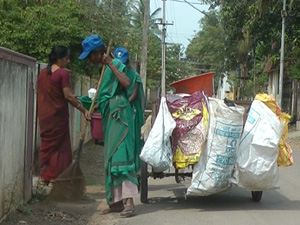Whether you're a single person or a large city, make sure your waste is not wasted.
A zero-waste town Back

Bobbili town in Andhra Pradesh is famous for the Venugopala Swami temple, but there is something else the locals are proud of as well. This town boasts of being a zero-waste zone, which simply means that all its garbage is recycled or reused. None of it reaches the landfill.
At the heart of this movement is an 8.5-care solid waste management park, which, from the outside, looks like a regular garden, complete with farm animals and lakes. In this park is a processing unit that creates compost and biogas out of organic waste. Paper is also segregated from other kinds of waste and sold off to paper mills.
But what happens in the park does not begin there. The 50,000+ residents of the town begin the process of waste management in their homes, where they segregate garbage into wet and dry waste. They have been doing this since 2011.
The municipality then collects this waste in separate bins and transports it to the park. In the park, there’s further segregation. Here, animals like ducks, dogs, pigs and chickens are also involved. Pigs eat up most of the food waste from hotels; ducks take care of leftovers from the fish market; and dogs eat leftover meat from homes. The other organic waste is converted into compost which can be used for gardening and agriculture. Animal dung is used in the seven biogas production units, which provide cooking gas within the premises, which is used by the workers to prepare their meals.
According to Suresh Bhandari, a solid waste management expert who has contributed to making Bobbili a zero-waste town, the highlight of the exercise has been getting people to understand the importance of separating waste. Self-help groups have held rallies and motivated people and children. Concepts of waste management have been explained to children in schools, who in turn have shared these with their parents. The municipality has also distributed separate bins to help people understand and segregate, and it has held special training workshops for its staff too. Additionally, plastic bags were banned, door-to-door collection was initiated, and effective transportation and processing of waste was begun.
All these efforts have paid off and surely, there’s much to learn from the town of Bobbili.